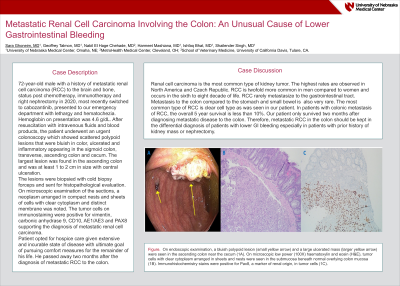Back

Poster Session D - Tuesday Morning
Category: Colon
D0107 - Metastatic Renal Cell Carcinoma Involving the Colon: An Unusual Cause of Lower Gastrointestinal Bleeding
Tuesday, October 25, 2022
10:00 AM – 12:00 PM ET
Location: Crown Ballroom


Sara Ghoneim, MD
University of Nebraska Medical Center
Omaha, NE
Presenting Author(s)
Award: Presidential Poster Award
Sara Ghoneim, MD1, Geoffrey Talmon, MD1, Nabil El Hage Chehade, MD2, Harmeet S. Mashiana, MD1, Ishfaq Bhat, MD1, Shailender Singh, MD1
1University of Nebraska Medical Center, Omaha, NE; 2MetroHealth Medical Center, Cleveland, OH
Introduction: Renal cell carcinoma (RCC) is a common tumor of the kidney. RCC will frequently metastasize to the lungs, brain, liver and brain. Metastatic RCC in the gastrointestinal tract is very rare. Here we report a case of a patient presenting with hematochezia found to have metastasis of RCC to the colon.
Case Description/Methods: 72 year old male with a history of metastatic renal cell carcinoma to the brain and bone, status post chemotherapy immunotherapy and right nephrectomy in 2020, most recently switched to cabozantinib, presented to our emergency department with lethargy and hematochezia. Hemoglobin on presentation was 4.6 g/dL. After resuscitation with intravenous fluids and blood products, the patient underwent an urgent colonoscopy which showed scattered polypoid lesions that were bluish in color, ulcerated and inflammatory appearing in the sigmoid colon, transverse, ascending colon and cecum. The largest lesion was found in the ascending colon and was at least 1 to 2 cm in size with central ulceration. The lesions were biopsied with cold biopsy forceps and sent for histopathological evaluation. On microscopic examination of the sections, a neoplasm arranged in compact nests and sheets of cells with clear cytoplasm and distinct membrane was noted.The tumor cells on immunostaining were positive for vimentin, carbonic anhydrase 9, CD10, AE1/AE3 and PAX8 supporting the diagnosis of metastatic renal cell carcinoma. Patient opted for hospice care given extensive and incurable state of disease with ultimate goal of pursuing comfort measures for the remainder of his life. He passed away two months after the diagnosis of metastatic RCC to the colon.
Discussion: Renal cell carcinoma is the most common type of kidney tumor. The highest rates are observed in North America and Czech Republic. RCC is twofold more common in men compared to women and occurs in the sixth to eight decade of life. RCC rarely metastasize to the gastrointestinal tract. Metastasis to the colon compared to the stomach and small bowel is very rare. The most common type of RCC is clear cell type as was seen in our patient. In patients with colonic metastasis of RCC, the overall 5 year survival is less than 10%. Our patient only survived two months after diagnosing metastatic disease to the colon. Therefore, metastatic RCC in the colon should be kept in the differential diagnosis of patients with lower GI bleeding especially in patients with prior history of kidney mass or nephrectomy.

Disclosures:
Sara Ghoneim, MD1, Geoffrey Talmon, MD1, Nabil El Hage Chehade, MD2, Harmeet S. Mashiana, MD1, Ishfaq Bhat, MD1, Shailender Singh, MD1. D0107 - Metastatic Renal Cell Carcinoma Involving the Colon: An Unusual Cause of Lower Gastrointestinal Bleeding, ACG 2022 Annual Scientific Meeting Abstracts. Charlotte, NC: American College of Gastroenterology.
Sara Ghoneim, MD1, Geoffrey Talmon, MD1, Nabil El Hage Chehade, MD2, Harmeet S. Mashiana, MD1, Ishfaq Bhat, MD1, Shailender Singh, MD1
1University of Nebraska Medical Center, Omaha, NE; 2MetroHealth Medical Center, Cleveland, OH
Introduction: Renal cell carcinoma (RCC) is a common tumor of the kidney. RCC will frequently metastasize to the lungs, brain, liver and brain. Metastatic RCC in the gastrointestinal tract is very rare. Here we report a case of a patient presenting with hematochezia found to have metastasis of RCC to the colon.
Case Description/Methods: 72 year old male with a history of metastatic renal cell carcinoma to the brain and bone, status post chemotherapy immunotherapy and right nephrectomy in 2020, most recently switched to cabozantinib, presented to our emergency department with lethargy and hematochezia. Hemoglobin on presentation was 4.6 g/dL. After resuscitation with intravenous fluids and blood products, the patient underwent an urgent colonoscopy which showed scattered polypoid lesions that were bluish in color, ulcerated and inflammatory appearing in the sigmoid colon, transverse, ascending colon and cecum. The largest lesion was found in the ascending colon and was at least 1 to 2 cm in size with central ulceration. The lesions were biopsied with cold biopsy forceps and sent for histopathological evaluation. On microscopic examination of the sections, a neoplasm arranged in compact nests and sheets of cells with clear cytoplasm and distinct membrane was noted.The tumor cells on immunostaining were positive for vimentin, carbonic anhydrase 9, CD10, AE1/AE3 and PAX8 supporting the diagnosis of metastatic renal cell carcinoma. Patient opted for hospice care given extensive and incurable state of disease with ultimate goal of pursuing comfort measures for the remainder of his life. He passed away two months after the diagnosis of metastatic RCC to the colon.
Discussion: Renal cell carcinoma is the most common type of kidney tumor. The highest rates are observed in North America and Czech Republic. RCC is twofold more common in men compared to women and occurs in the sixth to eight decade of life. RCC rarely metastasize to the gastrointestinal tract. Metastasis to the colon compared to the stomach and small bowel is very rare. The most common type of RCC is clear cell type as was seen in our patient. In patients with colonic metastasis of RCC, the overall 5 year survival is less than 10%. Our patient only survived two months after diagnosing metastatic disease to the colon. Therefore, metastatic RCC in the colon should be kept in the differential diagnosis of patients with lower GI bleeding especially in patients with prior history of kidney mass or nephrectomy.

Figure: Figure 1. On endoscopic examination, a bluish polypoid lesion (small yellow arrow) and a large ulcerated mass (larger yellow arrow) were seen in the ascending colon near the cecum (1A). On microscopic low power (100X) haematoxylin and eosin (H&E), tumor cells with clear cytoplasm arranged in sheets and nests were seen in the submucosa beneath normal overlying colon mucosa (1B). Immunohistochemistry stains were positive for Pax8, a marker of renal origin, in tumor cells (1C).
Disclosures:
Sara Ghoneim indicated no relevant financial relationships.
Geoffrey Talmon indicated no relevant financial relationships.
Nabil El Hage Chehade indicated no relevant financial relationships.
Harmeet Mashiana indicated no relevant financial relationships.
Ishfaq Bhat indicated no relevant financial relationships.
Shailender Singh indicated no relevant financial relationships.
Sara Ghoneim, MD1, Geoffrey Talmon, MD1, Nabil El Hage Chehade, MD2, Harmeet S. Mashiana, MD1, Ishfaq Bhat, MD1, Shailender Singh, MD1. D0107 - Metastatic Renal Cell Carcinoma Involving the Colon: An Unusual Cause of Lower Gastrointestinal Bleeding, ACG 2022 Annual Scientific Meeting Abstracts. Charlotte, NC: American College of Gastroenterology.

